Never Give Up the Fight to Get Better: Lolo Jones & Evander Holyfield
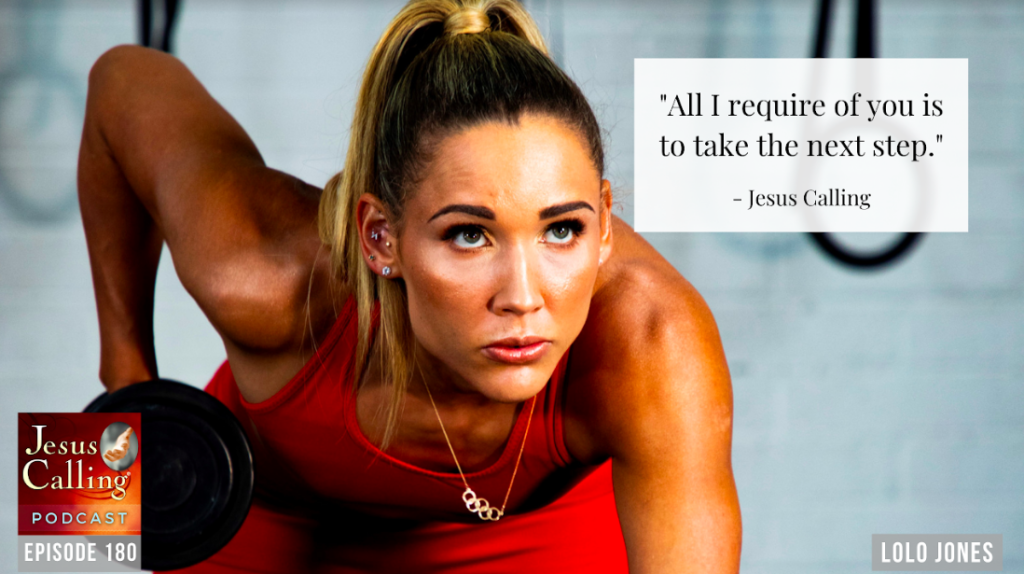
Lolo Jones: For God to show me that I can have peace in a storm is much more powerful to me than the gold medal that’s going to sit in my sock drawer.
Never Give Up the Fight to Get Better: Lolo Jones & Evander Holyfield – Episode #180
Narrator: Welcome to the Jesus Calling Podcast. Today’s guests both know what it’s like to fight to become the best they can be, despite challenges from their early years: three time world champion athlete Lolo Jones and four-time heavyweight boxing champion Evander Holyfield.
First up, Lolo Jones is one of only ten athletes in history to compete in both the Summer and Winter Olympic games. Lolo’s success as a hurdler, and later as a bobsledder, speaks to the incredible fortitude she’s honed as an endurance athlete, but also as a child who grew up in a home where her father was frequently incarcerated. Even as a young kid, Lolo was determined to succeed, and today she tells us how her incredible faith fueled her through triumphs, as well as the devastating moment she thought God was using her to show His glory—only to watch her quest for a gold medal dissolve before her very eyes.

Lolo Jones: I’m Lolo Jones, a summer and winter Olympic athlete, and a three-time world champion.
“All things work together for His glory.”
I grew up in Des Moines. I have five siblings total, I have three brothers and a sister. We had a rough childhood. My dad was in and out of prison growing up, and at one point, my mom lost her house, so we were homeless.
One day, she gave each one of her kids a blanket, put us in the car, and started driving. She said she didn’t know where she was going, she didn’t know where she was heading. And she ended up driving to the church we attended every weekend, the Salvation Army. So we actually lived in a church while we were homeless until my mom could get back [on her] feet.
The good thing about my parents, especially my dad, even though he was in and out of prison, was that he was a believer. And I think having him as an example in my life—even though we can believe in Christ and love Christ, we can still struggle with sin. He struggled. He struggled with alcoholism. He struggled with, you know, just different aspects. But at the same time, with all the demons and fears that he was facing, he still raised me to be a believer and took me to church every weekend, so I really see God’s grace in that whole situation.
I messed up at the Olympics and it cost me an Olympic gold. How can you ever recover from that? I look at my dad and see all the mistakes he’s made, yet still, good came from it. I can really see the Bible verse, “All things work together for His good and glory.”
Helping Others Overcome Their Hurdles
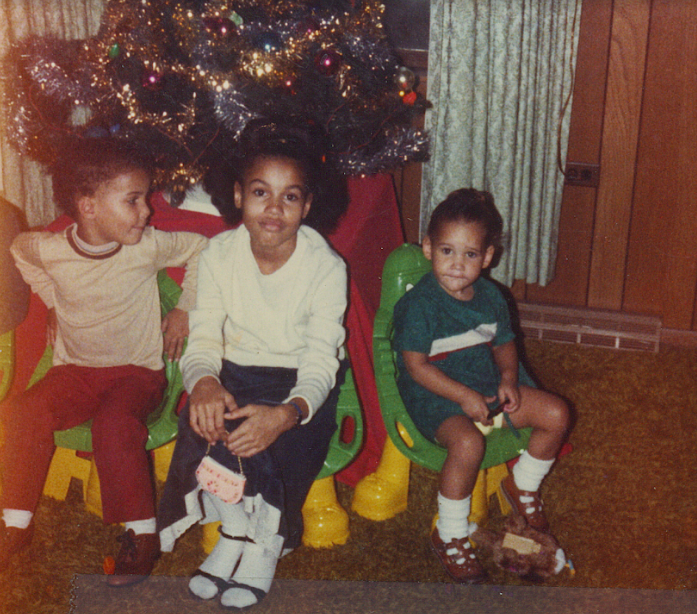
I definitely think that my hardships molded me for the life that I would have to go through later. There were times when I was embarrassed because if there was a school dance, I knew my mom didn’t have enough money to buy me a dress, so I just wouldn’t go to the school dance. Then some other parents found out, and offered to give me a secondhand dress. My first pair of running shoes were donated from somebody’s car, they had an extra pair of running shoes in the trunk of their car. My first pair of running shoes were hand-me-downs.
“I definitely think that my hardships molded me for the life that I would have to go through later.” – Lolo Jones
And I think that that’s always what’s kept me going. When you’re a runner, sometimes your hardest workouts break you down. You’re like, How am I going to get through this? Your body is failing on you. You feel all the pain accumulating in your legs. Your lungs are burning, but somehow you manage to get through. You’ve managed to finish by just enough. And once you cross that finish line, you are so strong and you just come alive. And I think that that’s what God was doing to me and my family in those moments, by just allowing just enough to really rely on Him and His provision.
I started the Hurdles of Hope Foundation to help single moms and families that have incarcerated parents, because that’s the environment I grew up in. I look back and I thought about all the shoes that were donated to me, all of the Christmas presents and Thanksgiving meals that were provided to my family because we couldn’t afford food or groceries.
I started the foundation because it’s such a hard thing to talk about. It’s such a hard thing for kids to go through. This statistic of kids that have incarcerated parents—it tremendously increases their chance that at one point in their life, they will be incarcerated as well. I wanted to break that chain. I wanted to break that cycle. I found an outlet through sports and helping other kids [find] whatever outlet they need to have a stable environment while they go through that situation.
“This statistic of kids that have incarcerated parents—it tremendously increases their chance that at one point in their life, they will be incarcerated as well. I wanted to break that chain.” – Lolo Jones
“I knew was on the right track, literally.”
I don’t know specifically how I became a runner, I just know that we never got a car growing up. We’d have a car for a season, and it would break down, and then we wouldn’t have a car. My main mode of transportation was walking to school, and I just found out that I would get there quicker and get to sleep in a little bit more [if I] could run.
When my dad was out of prison, there would be moments where we would have to go to the grocery store, and he would take me to the grocery store, and we’d run to the grocery store.
He’d be carrying the grocery bags, and I would be running next to him, and he would be walking me through how to control my breathing so I could keep running faster. I don’t have many childhood moments with my dad, because he was in and out of prison. But those were some of them.
I remember one time our car broke down, and it was a very cold night in Iowa. I think it was almost a blizzard, so he had me and I think my brother. We didn’t have any other family to come pick us up, so we ran home. We ran home. It was either stay in this cold car, or truck it up. And we ran home. Little did I know that that was preparing me for my job later. My job as a bobsled athlete was to run in some of the coldest conditions possible. And who knew that—me as a kid, the car breaking down, it’s freezing cold, and I remember my dad telling me how to run so I could keep the body heat up. That would all translate to me being a winter Olympic athlete, having to adapt to different environments.
All these nuggets that were my childhood, that most people consider a rough childhood, were actually little seeds that helped me throughout my career later on. I think that that encourages me and gives me faith nowadays, when I go through trials and tribulations, being able to look on those things. It didn’t make sense when I was a kid, it didn’t make sense why we could never afford a working car, or why all the other kids had their parents on school days. My mom was working two jobs, so she could never attend track meets. It never made sense at the time, but years later, a lot of things came together, and I know my childhood strengthened me for a time to stand on the world stage and compete.
“I know my childhood strengthened me for a time to stand on the world stage and compete.” – Lolo Jones
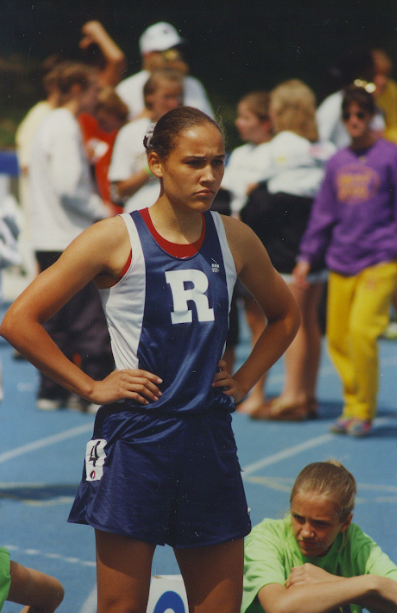
I needed something stable, so I gravitated towards sports. I played basketball and ran track. Any kind of extracurricular sports, I was there. I was always staying after school, wanting to just be active. That’s how I got involved in sports. I got involved with track and field, the hurdles, because I was doing everything in track and field, every event: long jump, the mile, high jump four by four, everything.
The coach approached me one day, and she said they needed a hurdler. She said, “All the other girls are afraid that they’ll fall.”
And I was like, “I’ll do it. I don’t care.”
She said, “They are afraid they will fall and they are going to get scars on their legs.”
I think it’s interesting, because even in life, sometimes people can have success, but that success is impeded, because they’re afraid they’re going to fail, they’re going to get hurt. I use it as motivation. I actually embraced it. I kept running the hurdles and I kept winning. I didn’t lose a race that whole season. I knew at that moment that I was on the right track, literally, within a track.
Competing on the World Stage

I knew that if I kept running on the pace I was, I could get a scholarship. I could be one of the first ones in my family to go to college, graduate, and break the cycle of poverty. I decided to go to LSU, because at the time, it was a powerhouse in track and field. It had won thirteen national titles.
My original goals with LSU were, obviously, to be successful, but I was just thrilled to have a scholarship and I was determined to keep that scholarship. Nothing’s guaranteed when you’re an athlete. I knew that if my scholarship was reduced in any way, I had no way to afford to go to college, so I worked diligently every day, so that I would be able to keep my scholarship and represent LSU in the best way. Focusing on that actually helped easily transition me into, Oh my gosh, I could possibly be an Olympic athlete.
I had a very successful college career. I was an eleven-time all-American. I had won an NCAA title, so I was one of the top collegiate hurdlers. I went to my first Olympic trials, and that’s where my world was completely shaken up. I mean, I was now competing against the pros, and I didn’t even make the final. I wasn’t even in the top eight in the U.S. I mean, you talk about going from [being] the top in college and then just being squashed like a bug. That’s essentially what happened.
I remember my first year, I was getting fifth through seventh in all of the professional races. Then my second-year pro, I was getting third through fifth, and then I started getting in the top three. The year of the 2008 Olympic trials, I went into the Olympic trials, and not only did I win, and make my first Olympic team, I became the fastest hurdler in the world. I went from four years ago, coming out of college, not even being good enough to be in the finals at the Olympic trials, to making my first Olympic team and being the best in the world.
I got to my first games, and I stayed focused. I ran the first two rounds. I kept getting faster. In the semifinals, I ran the fastest time ever in my life. I headed into the finals, the whole world was watching, and people were saying, “She’s running so fast she could break the Olympic record. She’s a shoo-in to win this medal.” I zoned it all out. I wanted to focus on being in the moment.
I remember the race set off, hurdle three, four, and five, I’m crushing it. I knew I was in the lead. And then out of nowhere, I hit the ninth hurdle. And in that moment, I knew I had lost the Olympic gold medal, but I figured I could still come away and squeak out a bronze or a silver.
I crossed the finish line, and I looked up at the scoreboard, and I see my name, and it says, “Seventh.” I was just absolutely devastated. I collapsed to the track. And I remember God whispering to me, “But you’re here. Four years ago, you were crying because you were sitting at home watching the Olympics on TV, and now you’re here.”

After that moment, I went back to the Olympic Village, and I went to my dorm room, and I did praise and worship. I was so grateful. My heart flooded with joy. It taught me so many different things, how we can continue to have promotions, and then the moment we get promoted, we are already looking for our next promotion and not being grateful for the new level God has given us.
It also taught me how to praise in the midst of my heartbreak, and that God could give me peace, joy, and clarity to hold me through those moments. That night, after I lost the Olympic gold, was my most peaceful night. That was the hardest, most hurtful race in my life. But that night, I had so much peace.
Looking back, if I go through hardships, I know to say, Okay, this really, really hurt me. This is frustrating. I wanted this so bad, and it was ripped away, instead of being like, How could you God? It’s like, Oh, you know what? God, give me your peace. Fill me up. Give me your joy right now in this moment, because I’m hurting and I need you to help me through this difficult time.
“If I go through hardships, I know to say, ‘Okay, this really, really hurt me. This is frustrating. I wanted this so bad, and it was ripped away,’ instead of being like,’ How could you, God?’ It’s like, ‘Oh, you know what? God, give me your peace.’” – Lolo Jones

The next Olympics, which were the London Olympics, I had spine surgery the year before, which almost ended my career. I was able to come back from that, but I was running terribly. I was losing every race. And when everybody is like, “There’s no way she’ll make this Olympic team at all,” I’m like, “But God.”
Looking back on that, I like having that moment, because even when I do have my doubts and fears and I let them overtake me, God can still use me. And that’s exactly what He did, because I should not have made that team. When I made that team, so many people were encouraged, because I had the lowest odds to make that team.
I think it’s funny, because sometimes we fight as Christians. We fight being in weak spots. We all want to be powerful. We want to be in the top position. But sometimes, God can use us more when we’re injured, when we’re not the best candidate, when we are the weaker candidate, when we don’t have all of our things together. Then, people can see a true transformation. They can see how God was able to come through it.
I headed off to the London Olympics, and I got through the rounds and I was in the final. I was the last person that made the final, and I ran a great race. So when I crossed the line, and I looked up at that scoreboard, and I saw my name at fourth, one spot shy of a medal, it was a different kind of pain. This time I got bitter. I mean, sometimes I think that as Christians, we try to predict how God’s going to use us, and when He doesn’t use us in that manner, we become hurt.
“As Christians, we try to predict how God’s going to use us, and when He doesn’t use us in that manner, we become hurt.” – Lolo Jones
For a month after, I just shut down. I went back to my house, and I did not leave my house. I pretty much just watched TV, and I felt like I wanted to be an athlete, but I just didn’t know how.
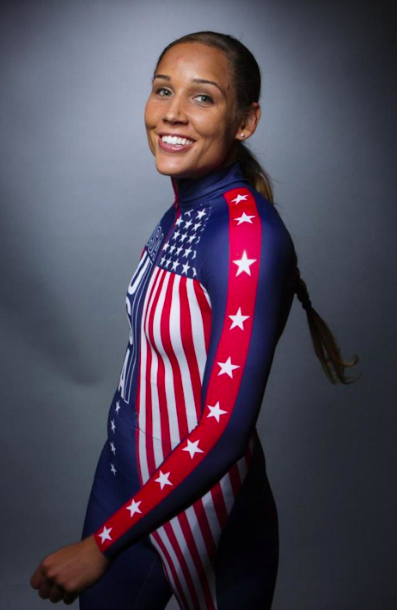
Who hasn’t seen the movie Cool Runnings? I mean, I grew up on this movie. It’s a classic, and I guess [I watched it] because I was watching so much TV. And that’s when I was like, You know what? I’m going to go bobsled. No one’s going to expect [things from] me or put any pressure on me to make this Olympic team, because it’s not my sport. I wanted to go out there and see if I enjoyed being an athlete again, and that’s what led me to be on the path to make my third Olympic team.
When Our Losses Mean More Than Our Victories
I love Jesus Calling. It’s a great podcast. It’s a great app. I like Jesus Calling because it’s gotten me through some of my hardest seasons in life, when I started to lose faith. One thing I’ve never lost faith in is God, He is an amazing provider.
I’m reading July 14th.
Keep walking with Me along the path I have chosen for you. Your desire to live close to Me is a delight to My heart. I could instantly grant you the spiritual riches you desire, but that is not My way for you. Together we will forge a pathway up the high mountain. The journey is arduous at times, and you are weak. Someday you will dance light-footed on the high peaks; but for now your walk is often plodding and heavy. All I require of you is to take the next step, clinging to My hand for strength and direction. Though the path is difficult and the scenery dull at the moment, there are sparkling surprises just around the bend. Stay on the path I have selected for you. It is truly the path of Life.
I guess I’d say that if being a runner, an Olympian, has taught me anything, of all the races I’ve competed in, a lot of the races I’ve lost have actually meant more than me than some of my victories, because it showed me what I had to do to persevere, to press on, to not give up to cross the finish line.

The Jesus Calling app says to focus step by step, and there’s so many times in life, in practice, when I’m so tired, all I can do is think about the next step, and I just try to apply that to life. You know, I’m having a bad day. I’m overwhelmed, I don’t feel like I’ll ever make another Olympic team. People call me washed up. And I just focus on the step.
Narrator: To learn more about you can help others with incarcerated loved ones through the Hurdles of Hope Foundation, go to lolojonesusa.com.
Stay tuned to hear from world champion boxer Evander Holyfield after a brief message about a way you can connect with other Jesus Calling readers each week in prayer.

Did you know that Sarah Young, the author of Jesus Calling, prays for her readers each day? In that spirit, we want to extend the Jesus Calling prayer community out to you in a more personal way. Each Tuesday morning, you can dial in to the Jesus Calling Weekly Prayer Call, where the team from Jesus Calling and special guests will minister to us during a ten-minute call to reflect on that day’s passage from Jesus Calling, read scripture references, and pray together for each other and our world. Prayer call times are 8:00 a.m. Eastern, 7:00 a.m. Central, 6:00 a.m. Mountain, and 5:00 a.m. Pacific and are for U.S. only.
For more information on the Jesus Calling Weekly Prayer Call, or to submit prayer requests, please visit www.jesuscalling.com/prayer-call.
Narrator: Our next guest is four-time heavyweight boxing champion of the world, Evander Holyfield. When Evander was only 8 years old, a mentor from Atlanta’s Boy’s Clubs of America saw raw boxing talent in a kid from Alabama who excelled at most sports he tried. Evander’s natural athleticism made it hard to narrow down which sport he should pursue, so with encouragement from his mother to “find one thing and stick to it,” Evander began boxing. His determination to become the best in the world, mixed with his desire to make his mother happy, motivated him to fight to win. Even after retirement age, he couldn’t be satisfied with tying the record for all-time most championships—he wanted to break it. But he never forgot the words of his mother, who reminded him not to worry about the things he didn’t have, but to be thankful for the things he did.
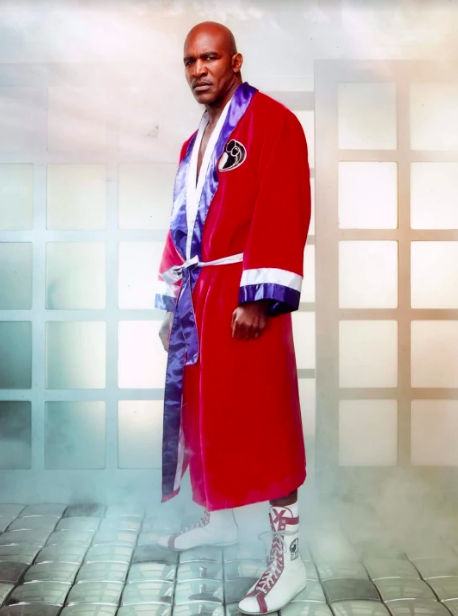
Evander Holyfield: I’m Evander Holyfield. Born October 19th, 1962. Four-time middleweight champion, world undisputed cruiserweight champ of the world, and one of the best fighters in the world.
Finding Inspiration from Two Loving Figures
I was born in Alabama, and we moved to Atlanta from Alabama when I was four years old. Pretty much everything started in Atlanta. I had a good Boys Club. When I was six years old, and my life started changing at the Boys Club, it was like the best training ever.
As a kid, I was told that I was going to be great. I [have been] happy to practice all my life. As a kid, people looked at me and said, “A great thing, this kid here.” I got in trouble as a kid, I got all these whoopings. But I always believed. I always believed in Christ.
The most important thing I wanted was to help my mom. I love my mom. You know, with a capital L. I love my momma, and I wanted things to work, and I wanted to do everything that was necessary. I thought I could make her happy. And [what made] her happy was me going to church and doing the right thing, so I became who I am because I really wanted to please my momma. My mom was so disappointed so much her life, and I wanted to be that joy. I wanted to be the best.
“I became who I am because I really wanted to please my momma. My mom was so disappointed so much her life, and I wanted to be that joy.” – Evander Holyfield
Evander’s Path to Boxing
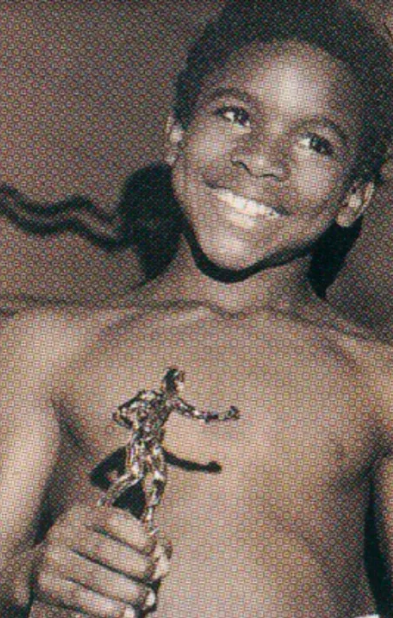
As a kid, I was very athletic. I did a lot of things well. And my mama started telling me, she said, “Son, you ain’t got enough time to be great at everything. You’ve got to find one thing and stick to it.” Everything came down to football and boxing.
But, of course, I liked football better, because I like people. I’m a people person. It is easy to do it, because of the fact that you compete with somebody. But boxing, when you practice, you compete by yourself.
I wanted to play football more than I wanted to box, but I got into boxing because, the fact of the matter, I lied to the coach, because he told me I had to be on the boxing team, so I told him I wanted to be on the boxing team because I wanted to hit the speed bag. So once I hit the speed bag, he said I could be the heavyweight champ of the world.
He said, “Do you know you could be like Muhammad Ali?”
I said, “I’m only eight years old.”
He said, “You won’t always be eight.”
Now I believed him, because the next week I was going to be nine.
He asked me, “What do you think about being like my Muhammed Ali?”
I looked at him, and I said, “Well, I’ve got to ask my momma.”
And he looked at me and he said, “Oh, you’ve got a good mom. Then you go home and ask that good mom.”
So I went to ask my mom, and I said, “Momma, this white man at the boy’s club said that I could be like Muhammad Ali.”
My mom said, “What?”
I said, “Momma, you see, I could be like Muhammad Ali.”
So my mom said, “Do you know what they are gonna do to you?”
“No.”
“They’re gonna hit you.”
I start laughing, because I get hit all the time. I get all these whippings, I get hit all the time. So my mom said, “Well, you can’t hit them back,” because I can’t hit my brothers and sisters back.
And that’s how I started, somebody said I could be great like Muhammad Ali. But, you know, it was a secret that I wasn’t going to tell anybody about. I knew people would say, “You ain’t gonna be nothing.”
But at nine years old, I had my first bout. I won a trophy, brought the trophy home, and my mom put that up on the top. Everybody came in. They asked, “Miss Holyfield, who is the fighter?”
She said, “That little thing right there.”
And they’d say, “He’s little.”
But my momma said, “He can sure fight.”
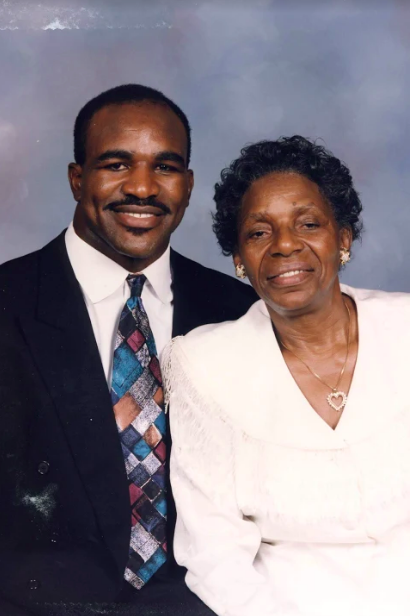
Oh, I found a way that I could make my mom happy. The first time my mother went to see me fight was an Olympic trial, and I had to beg her to go. I said, “Come on, Mom, you’ve got to go.” So she came, and I lost, and I got to fight the guy again. She didn’t come to that fight, and I beat him.
So she didn’t come the first time I fought. The second time I fought, she didn’t come. The third fight she didn’t, and I’m like, “Come on, Mom, when are you gonna come to the fight, you gotta come to the fight.” She comes to fight. I get disqualified.
My momma started telling me, she said, “Son, I don’t think I’m good luck for you.”
I said, “Mom, we can’t believe that way.”
And so, of course, I turn pro. My momma doesn’t come to any of the pro bouts.
When it came to heavyweight fight, I said, “Mom, do you remember when that man told me I could be the heavyweight champ of the world? I was eight years old.” It had been twenty years, so I’d be twenty-eight. I told my mom, “You’ve got to come.”
She decides she’ll come, she came up the night before the fight.
In the morning, I woke up and my phone rang and it’s my mom. She says, “Son, can I come up and see you?”
“What’s wrong, Mom?”
She came in, she said, “I’ve got to talk to you about something.”
I said, “What?”
She said, “Son, do you not know that I can’t stand anyone to hit you? Has anybody ever hit you in front of me?”
I said, “No.”
She said, “See, I can’t stand for it, it makes me want to come and help you.” And she said, “Son, do you mind if I just stay in the room and just pray for you?”
“Okay, no problem.”
She said, “Well, I’m gonna pray for you, but save the first dance for me.”
I said, “Okay.”
I knocked the guy out in the third round, and my momma came to the after party. She came and everybody said, “Oh, man, your momma can dance.” She didn’t go to any more fights, she only watched the fights on TV and had a heart attack even watching the TV. She had a hard time seeing me get hit.
Striving to Be the Best
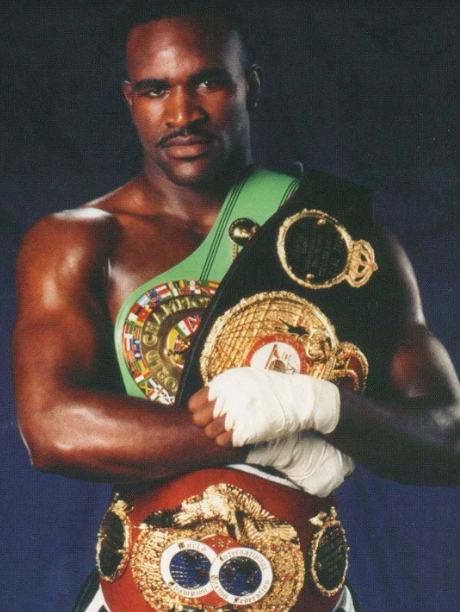
Once I became heavyweight champion of the world, it got harder. I didn’t just fight to be the heavyweight champ, I wanted to be the best. The first person I lost against, this guy named Riddick Bowe, my mom didn’t want me to fight any more after I lost
My mom said, “You made a lot of money,” but it wasn’t the money. I wanted to be the very best, so I fought him again, and I beat him. I’d become the two-time heavyweight champion of the world, and then I lost against a guy named Michael Moorer. I went back and realized, I can’t quit now. I lost, and you’ve got to end up with a win.
It took a while, and I had to fight Mike Tyson. I finally got the opportunity to fight Mike Tyson in 1996, and I won. Three-time heavyweight champ in the world, just like Muhammad Ali.
My job was to be the undisputed three-time world heavyweight champion and leave it alone. But what happened? I end up fighting, and I fight Lennox Lewis. They called it a draw one time, and the second time, they gave it to him because they knew that I was going to retire. But because I lost to Lennox Lewis, I’m wasn’t retiring. I was going to fight again.
I fought a guy, John Ruiz, and I became the only four-time heavyweight champ in the world. Records are meant to be broken. I find that having setbacks paves the way to show you how good God is. He gave me that opportunity, because if you think about it, I never lost anything.
“Having setbacks paves the way to show you how good God is.” – Evander Holyfield
I’d be telling everybody, “Well, I’m great.” I would. Now, every time things don’t work, that makes you call on Jesus Christ. I realized that, and I said, “Well, you know what? Every time you mess up, you’ve got to have Somebody who will give you another opportunity.” I’m just honored to give God praise for what He’s given me, to be that light, and to tell people that you’ve got to dream big.
“Every time you mess up, you’ve got to have Somebody who will give you another opportunity.” – Evander Holyfield
I became who I am because my mom was constantly telling me, “Be thankful for what you have. Stop worrying about things that you don’t have. Be thankful for what you have.”
Narrator: To keep up with what Evander Holyfield is doing in his life after boxing, please visit EvanderHolyfield.com.
If you’d like to hear more stories about athletes who persevere through their faith, check out our interview with NASCAR driver Michael McDowell.
Narrator: Next time on the Jesus Calling Podcast, we talk with author and speaker Beth McCord. Beth is passionate about helping others find meaningful relationships and a life of deep purpose using a tool called the Enneagram, a system of personality typing that describes the different ways people view the world and manage their emotions. Beth describes how understanding her own personality helped her relationship with her husband, Jeff, early in their marriage.
Beth McCord: This gave me the clarity to tell Jeff more about myself in ways that I couldn’t have described all my own. It really led to so much more clarity between us, understanding, empathy, mercy, and grace. And it really allowed our relationship to blossom. Now, it took years for us to really understand ourselves and our personality types, so it’s a forever growing process, but it really helped to accelerate our growth and transformation toward each other.
Narrator: Do you love hearing these stories of faith weekly from people like you whose lives have been changed by a closer walk with God? Then be sure to subscribe to the Jesus Calling: Stories of Faith Podcast on Apple Podcasts, Stitcher, or wherever you listen to your podcasts. If you like what you’re hearing, leave us a review so that we can reach others with these inspirational stories. And, you can also see these interviews on video as part of our original web series with a new interview premiering every other Sunday on Facebook Live. Find previously broadcasted interviews on our Youtube channel, on IGTV, or on jesuscalling.com/media/video.


One thought on “Never Give Up the Fight to Get Better: Lolo Jones & Evander Holyfield”
Comments are closed.